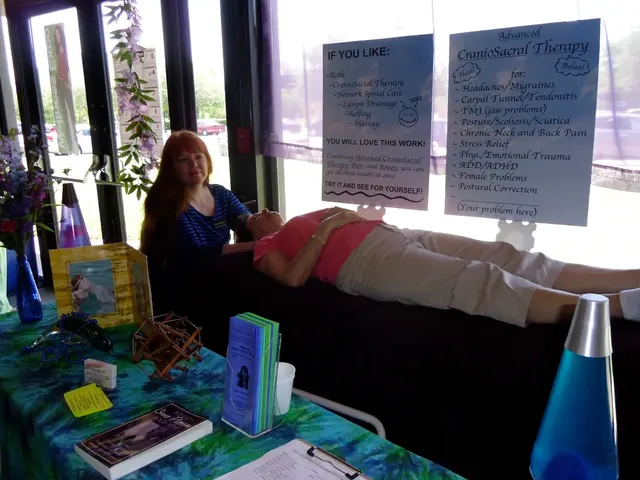Essential Life Strategies for Partners Without ADHD
Thriving in a Relationship When One Partner Has ADHD
Maintaining a harmonious relationship can be challenging when one partner lives with Attention Deficit Hyperactivity Disorder (ADHD), but implementing effective strategies can help improve communication, develop emotional resilience, manage daily responsibilities, resolve conflicts, and strengthen the bond. This guide offers advice and practical steps for non-ADHD partners to navigate the unique landscape of their partnerships.
Key Takeaways:- Clear, compassionate communication techniques are essential for bridging the gaps caused by ADHD-related obstacles.- Managing one’s emotions, avoiding personalizing symptoms, and prioritizing self-care are crucial for preventing burnout.- Shared responsibilities require systems, task division based on strengths, and a conscious effort to avoid overfunctioning.- Fighting fair involves taking breaks during heated moments, using calm language, and problem-solving together to maintain intimacy.- Consider seeking therapy or support groups for additional strategies and emotional support.
- Communication Strategies:Effective communication is the cornerstone of any relationship, particularly where ADHD is present. Misunderstandings can easily arise due to distraction, forgetfulness, or impulsivity. Clear, compassionate communication techniques can help mitigate these differences. Here are practical steps to improve communication with an ADHD partner:
- Practice Active Listening: Minimize distractions during essential discussions, listen attentively, and rephrase what you’ve heard to ensure messages aren’t lost.
- Use "I" Statements: Discuss issues from your perspective to avoid defensiveness. Frame your opinions as "I" statements instead of accusations.
- Avoid the Parent-Child Dynamic: Speak to your partner as an equal by making requests, not demands, and avoiding criticisms that may prompt defensiveness or withdrawal.
- Show Empathy and Understanding: Remember that ADHD-related forgetfulness or impulsivity is not deliberate. Recognize their effort when they try to follow through or commit to improvements, even if the results are not perfect.
- Emotional Resilience:Being the non-ADHD partner can sometimes be emotionally taxing. Building emotional resilience involves managing your emotions, maintaining patience, and preventing exhaustion. Consider the following techniques to strengthen your resilience:
- Don't Take Symptoms Personally: Remind yourself that ADHD symptoms reflect a neurodivergent brain, not a lack of love or respect. Maintaining this perspective can help reduce feelings of hurt or personal rejection.
- "Keep Your Cool": Avoid reacting with rage or nagging every time something goes wrong, as doing so may cause valid points to be dismissed. Postpone the discussion until you can approach it constructively rather than with anger.
- Prioritize Self-Care: Make time for activities that reduce stress, bring joy, or provide relaxation. Engaging in personal downtime helps replenish your emotional energy and prevents chronic anxiety.
- Set Healthy Boundaries: It’s important to establish limits on what you can handle. If certain behaviors or patterns are hurtful or unsustainable, communicate your boundaries, and enforce them kindly but consistently.
- Tap into Support and Professional Help: Sometimes seeking the advice of a therapist can provide new strategies and an outlet for your feelings. Counselors experienced in ADHD relationships can teach both partners skills for managing symptoms and improving emotional connections.
- Relationship Management:Managing practical aspects of life together can be a source of stress in ADHD relationships. Shared household responsibilities, finances, and parenting duties can feel unbalanced if not managed thoughtfully. Create balance and systems that support both partners, so responsibilities don’t fall solely on one person and things don’t slip through the cracks. Here are strategies to organize your life as a team:
- Discuss Roles and Divide Responsibilities: Sit down together and openly talk about who can handle which tasks best. Divide responsibilities based on strengths to prevent constant frustration.
- Set Up Shared Systems and Tools: Utilize external systems to keep your lives organized. Many couples find success using shared calendars, reminder apps, alarms, and other tools to manage tasks and dates.
- Avoid Overfunctioning: Don’t take on everything yourself; letting your partner manage their own tasks encourages them to take responsibility, preventing learned helplessness.
- Agree on Expectations and Consequences: Misaligned expectations can cause conflict. Have honest conversations about what each of you expects around shared responsibilities. Discuss what happens if commitments aren’t met, and reach logical compromises.
- Conflict Resolution:No relationship is without conflict, and ADHD may introduce unique sources of friction, leading to arguments. The goal is not to avoid conflict altogether but to learn to address disagreements in a healthy, productive way. Here are strategies to address misunderstandings and maintain emotional intimacy despite the challenges:
- Pause and Take Breaks: If a disagreement starts to heat up, take a break to cool down. Calling a timeout can help break the cycle of yelling or saying things you regret.
- Use Calm Language and "I" Statements: Be mindful of your tone. Speaking calmly and using "I" statements can help your partner stay engaged and prevent defensive reactions.
- Practice Reflective Listening: When arguments happen, one of the biggest problems is that partners stop listening to each other. Listening actively, paraphrasing, and acknowledging your partner’s feelings can help rebuild communication and empathy.
- Problem-Solve Together: Schedule time to discuss the issue rationally once calm. Work together to find solutions while taking into consideration any ADHD-related accommodations.
- Maintain Emotional Intimacy: Conflict can strain emotional intimacy, but resolving conflict can strengthen it if done constructively. Offer sincere apologies, forgive, and give positive feedback to repair any lingering hurt.
- Prioritize Understanding: Educate yourself about ADHD to achieve a deeper understanding and patience for your partner's behavior. Remind yourself that they are not intentionally causing distress.
- Encourage Self-Improvement: Support your partner in seeking professional help, such as therapy, when appropriate, to empower them to learn helpful coping strategies and address depression or anxiety.
- Focus on the Positive: Consciously appreciate your partner's strengths and positive attributes to help cultivate a positive outlook and reduce stress in your relationship.
- Nurture Mental and Emotional Health: Embrace the importance of mental health when it comes to your partnership, and nurture both yours and your partner's mental wellness by practicing self-care, learning psychology, and adopting healthy lifestyle habits, such as exercise, nutrition, and mindfulness.
- Keep the Communication Lines Open: Regularly check in with your partner about their feelings and thoughts, encouraging open and honest discussions. This helps maintain a strong emotional bond and provides a support system during difficult times.
- Model Behavior for Your Partner: Demonstrate the behaviors you'd like to see, such as patience, empathy, and positive communication, as those actions can have a powerful influence on your partner.
- Seek Knowledge: Stay informed about mental health news, trends, and research within the science community, particularly as it relates to ADHD, depression, and anxiety. This understanding can help contribute to better, more compassionate relationships.
- Redefine Your Expectations: Recognize that a relationship with an ADHD partner will be unique, and adapt your expectations about how responsibilities are shared, what conflict resolution looks like, and the sacrifices that may be necessary to foster emotional connection and stability.








